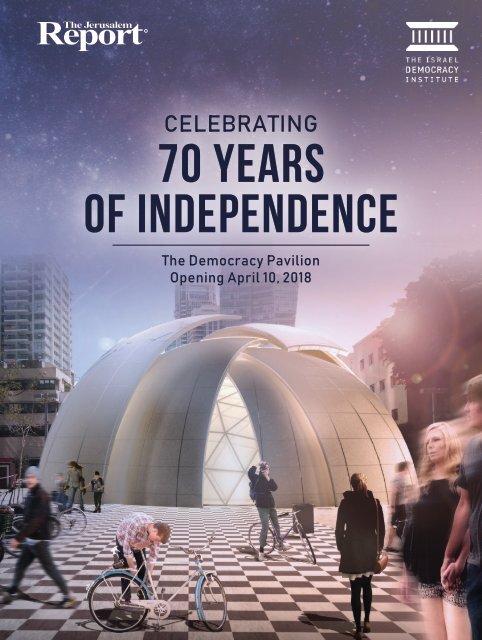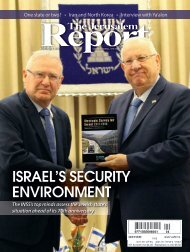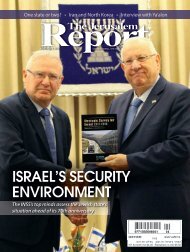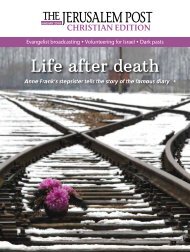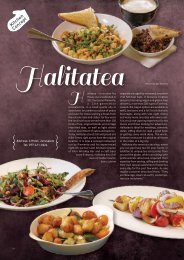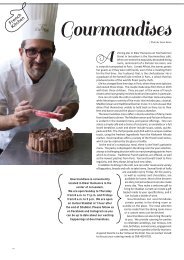IDI.2018
Create successful ePaper yourself
Turn your PDF publications into a flip-book with our unique Google optimized e-Paper software.
R<br />
Report<br />
The Jerusalem<br />
CELEBRATING<br />
70 years<br />
of independence<br />
The Democracy Pavilion<br />
Opening April 10, 2018<br />
70 YEARS OF INDEPENDENCE 1
The Jerusalem<br />
ReportR<br />
MARC ISRAEL SELLEM IDI<br />
3 The Democracy Pavilion<br />
Greetings from Thaddeus (Tad) N. Taube<br />
4 The Jewish State’s balancing act Justice Dorit Beinisch and<br />
Yohanan Plesner voice optimism about Israel’s future by Steve Linde<br />
TABLE OF CONTENTS<br />
8 A people’s army amidst social change<br />
A round- table discussion with Yuval Shany,<br />
Maj.-Gen. (ret.) Orna Barbivai and Amichai Cohen<br />
by Arieh O’Sullivan<br />
10 Israel needs to invest in the skills of the<br />
future Shraga Brosh and Daphna Aviram-Nitzan urge<br />
the government to train workers for the future job market<br />
by Steve Linde<br />
12 Media in crisis: Who should decide what<br />
enters the public domain?<br />
by Tehilla Shwartz Altshuler<br />
13 Women in local government: The 2018<br />
municipal elections are a golden opportunity<br />
by Ofer Kenig<br />
14 A balanced policy: The key to ultra-Orthodox<br />
integration<br />
by Gilad Malach and Lee Cahaner<br />
15 The ultra-Orthodox community in Israel<br />
Select facts and figures<br />
16 Progress in informal education plan: A<br />
victory for Israel and its Arab youth<br />
by Nasreen Hadad Haj-Yahya<br />
17 Jews and Arabs: A conditional partnership<br />
18 Israeli democracy at 70: Facts and figures<br />
from the 2017 Israeli Democracy Index<br />
20 IDI in numbers<br />
YOCHEVED LAUREN LAUFER<br />
6 The rift between religion and state<br />
Yedidia Stern and Alan Hoffmann recommend an ‘all in the family’<br />
perspective to overcome challenges between Jews in Israel and the<br />
Diaspora by Maayan Hoffman<br />
Magazine Editor: STEVE LINDE<br />
Copy Editors: ILANIT CHERNICK<br />
Manager of Business Development: REUT LEVY LAURSEN<br />
IDI Director of International Communications: DANAE MARX CALLAF<br />
Graphic Artists: DARIA LEMESHKIN and DANIELA MICHAL GLEISER<br />
Cover photo: Illustration of the planned Democracy Pavilion<br />
in Tel Aviv; Planning and production: Disk-In;<br />
Architecture and Design: Ollech Studio<br />
2<br />
70 YEARS OF INDEPENDENCE
Dear Friends,<br />
APRIL 19 th marks the 70th anniversary<br />
of the establishment of the State of Israel.<br />
The return of the Jewish people to their<br />
ancestral homeland and the creation of an<br />
independent state after the Holocaust is one<br />
of the greatest miracles of the twentieth<br />
century. Israelis have overcome tremendous<br />
odds, made the desert bloom, absorbed<br />
millions of immigrants, created a thriving first-world economy, and<br />
founded a flourishing democracy in a sea of authoritarian hostility.<br />
Part of my life’s mission, and the mission of Taube Philanthropies,<br />
is to support the survival of Jewish life and culture in the face of<br />
unprecedented global threats to the Jewish people, especially in<br />
Israel. The resilience exhibited by Israelis over the last seventy years<br />
owes much to the extraordinary vision put forth by their founding<br />
fathers in the Declaration of Independence of May 15, 1948. I am<br />
therefore very proud to support IDI’s exciting initiative to showcase<br />
the values embedded in the Declaration on the occasion of Israel’s<br />
70th anniversary.<br />
The Democracy Pavilion – a joint venture between IDI and the<br />
City of Tel Aviv – is a world-class exhibition designed to share<br />
the principles upon which the state was founded with millions of<br />
visitors from Israel and abroad.<br />
Situated in the heart of Tel Aviv, at the very site of Israel’s birth,<br />
outside Independence Hall, where David Ben-Gurion signed the<br />
Declaration of Independence, the pavilion will offer an evocative<br />
audiovisual experience grounded in that sacred text. It will also<br />
serve as the starting point for the city’s Independence Trail –<br />
modeled after Boston’s Freedom Trail – on a 1 km stretch of the<br />
historic Rothschild Boulevard.<br />
At this moment, it is important to underscore Israel’s many<br />
challenges and triumphs, while highlighting its moral contributions<br />
to the world of nations and reinforcing the unshakable bond between<br />
Israel and the Diaspora. I am proud to be a part of this opportunity to<br />
display Israel’s democracy to the world, and hope the Pavilion will<br />
inspire pride in Israelis, Jews and supporters of Israel everywhere.<br />
This timely initiative reaffirms the enduring value of these<br />
founding principles for present-day Israel. May these values<br />
continue to guide Israel and its people through the next 70 years of<br />
achievement.<br />
<br />
<br />
<br />
Happy Independence Day,<br />
Thaddeus N. “Tad” Taube<br />
Welcome to the Democracy Pavilion!<br />
TO CELEBRATE Israel’s 70th birthday at<br />
the scene of its birth, the Israel Democracy<br />
Institute and the City of Tel Aviv are<br />
building a world-class visitors’ center<br />
outside Independence Hall. The cover<br />
photograph of this special magazine is an<br />
illustration of what the center will look like.<br />
The center will feature an inspiring<br />
multi-media experience, showcasing the<br />
values embedded in Israel’s Declaration of<br />
Independence. It will serve as a gateway for<br />
millions of Israeli citizens and visitors from<br />
around the world as they embark on the new<br />
Independence Trail, Tel Aviv’s hottest new<br />
tourist attraction.<br />
The center will be inaugurated this<br />
coming April 10th, 70 years after David<br />
Ben-Gurion, the country’s first prime<br />
minister, read out Israel’s Declaration of<br />
Independence, founding the State of Israel.<br />
It will serve as the first station of Tel Aviv’s<br />
Independence Trail, which is modeled after<br />
Boston’s Freedom Trail.<br />
“We aim to design a profound audiovisual<br />
experience that will evoke the values<br />
upon which Israel was founded,” said<br />
Yohanan Plesner, the President of the Israel<br />
Democracy Institute. “The experience will<br />
An illustration of the projected interior of the Democracy Pavilion in Tel Aviv<br />
showcase Israeli democracy to the world<br />
while impressing upon millions of Israelis<br />
the critical importance of preserving Israel’s<br />
democratic vitality – at a time of mounting<br />
challenges to democracy globally.<br />
Ultimately, we aim to reinforce the values<br />
and institutions that have driven Israel’s<br />
success story over the last seven decades.”<br />
IDI<br />
70 YEARS OF INDEPENDENCE 3
Democracy<br />
Fertile ground<br />
for growth: the<br />
Jewish State’s<br />
balancing act<br />
MARC ISRAEL SELLEM<br />
Beinisch and Plesner voice optimism<br />
about the future of Israel despite<br />
current tensions and threats to its<br />
democracy By Steve Linde<br />
Yohanan Plesner, the President of the Israel Democracy<br />
Institute, and Justice Dorit Beinisch, the former President of<br />
the Supreme Court of Israel<br />
FORMER SUPREME Court President, Justice<br />
Dorit Beinisch and Israel Democracy<br />
Institute President, Yohanan Plesner, believe<br />
that Israel can strike the right balance between<br />
being a strong democracy and a Jewish<br />
state. In an interview at the Israel Democracy<br />
Institute in Jerusalem, they both said that in<br />
spite of the challenges and threats to Israel’s<br />
fragile democracy as it celebrates its 70th<br />
birthday, they are upbeat about the future of<br />
the country.<br />
How do you see the state of democracy in<br />
Israel today?<br />
Beinisch: I believe our democracy will be<br />
here for years, but it’s a fragile democracy.<br />
There are many dangers we have to overcome<br />
if we truly wish to sustain a liberal democracy,<br />
despite the multifaceted challenges we face in<br />
Israel. Israel has many problems, but I want<br />
to believe and do believe that our democracy<br />
will remain stable in spite of the dangers<br />
that we face. Considering the history of the<br />
State of Israel, it’s actually a miracle that we<br />
have established a democracy here, amidst<br />
such difficult conditions. At the beginning it<br />
was hard, but I believe that we have many<br />
significant achievements to show for it. The<br />
problem will be to uphold our achievements,<br />
given the global climate and the turbulence of<br />
our region. This is a challenge that we, as a<br />
4<br />
nation, will have to confront in the future.<br />
Plesner: There are some unique pressures<br />
on Israel’s democracy, and some global trends<br />
that are threatening Western democracies in<br />
general, as the explosive growth of social<br />
media. Israel’s democracy has proven to<br />
be extremely resilient if we consider the<br />
challenges it has had to overcome since the<br />
establishment of the state. At the same time,<br />
we are discovering how fragile it is. I believe<br />
the next few years are going to continue to<br />
pose significant challenges to our democracy.<br />
Thankfully, I think we can count on the Israeli<br />
public. It turns out Israeli public opinion is<br />
deeply supportive of Israel as a Jewish and<br />
democratic state, and favors constitutional<br />
freedoms such as freedom of speech. Our<br />
institutions have also proven to be strong.<br />
So I believe that we have the two pillars<br />
needed to maintain and foster Israeli<br />
democracy; the support of the people and<br />
robust institutions. But both of these need<br />
nurturing.<br />
Justice Beinisch, how do you see the<br />
relationship between the judicial and<br />
executive branches in the country?<br />
Beinisch: There is tension. It happens<br />
everywhere. It is normal for there to be<br />
a tension between the judiciary and the<br />
legislature, because the judiciary also applies<br />
70 YEARS OF INDEPENDENCE<br />
judicial review on the legislature. Yet in<br />
Israel, judicial review is not practiced enough.<br />
The legislature does not fully comprehend<br />
the significance of judicial review, because<br />
Israel has never had a constitution. We have a<br />
parliamentary system, so extending the court’s<br />
responsibilities to reviewing legislation isn’t<br />
easy, and this tension is endangering the<br />
strength of the court, which is crucial for a<br />
functioning democracy.<br />
As Israel approaches its 70th birthday, do<br />
you think it needs a constitution?<br />
Beinisch: I’m sure we need one, but I’m<br />
not too optimistic about the prospect of<br />
adopting a constitution. Considering the<br />
current situation in the Knesset, I often think<br />
it’d be better to wait, because I don’t think we<br />
can rely on our current legislature to pass the<br />
best possible constitution. Actually, we lost<br />
our constitutional moment when the state was<br />
established. There were many reasons for<br />
that, and since then, the process has been very<br />
difficult. It will take time<br />
Plesner: There are some major underlying<br />
disputes that have yet to be resolved. One<br />
concerns the constitution. We are a functioning<br />
democracy without a foundational document,<br />
which is unique. We haven’t decided basic<br />
questions of religion and state. We left them<br />
undecided, and that creates constant pressures
and tensions. Should Israel be more Jewish or<br />
more democratic, and how do we strike the<br />
right balance? The social fragmentation in<br />
Israeli society adds additional pressure to the<br />
system, as do ongoing security pressures. So<br />
when you take into consideration all of these<br />
pressures, it underscores how remarkable it<br />
truly is that we have preserved a functioning<br />
democracy against all odds.<br />
Some observers argue that there has been<br />
an erosion of democracy in Israel, and<br />
they point to a range of bills that have been<br />
presented to the Knesset. Do you see this<br />
erosion or are you hopeful that this process<br />
will be reversed in the future?<br />
Plesner: Definitely over the past seven or<br />
eight years, we’ve seen a wave of populist<br />
legislative and policy initiatives. This is<br />
obviously bad news for Israeli democracy,<br />
for its strength, resilience and viability. At<br />
the same time, we have to recognize that the<br />
vast majority of those initiatives have been<br />
suspended, mitigated or taken off the table,<br />
and very few have actually passed into law.<br />
If this wave of populist initiatives continues,<br />
it might constitute an increasing threat to<br />
our democracy. But in comparison to other<br />
countries, like some in Eastern Europe,<br />
where we’ve witnessed a subversion of<br />
constitutional arrangements over the past two<br />
years, very little has changed in Israel except<br />
for a tainted discourse.<br />
What do you see as the main challenges<br />
and threats to Israeli democracy, including<br />
the tainted discourse?<br />
Beinisch: The problem is that there is<br />
still no consensus as to what it means to be<br />
a Jewish, democratic state; we don’t know<br />
how to balance these two components of our<br />
state. I think almost everybody agrees that it’s<br />
a Jewish and democratic state. But what does<br />
this mean? There is no agreement between<br />
religious and secular groups on what it means<br />
to be a Jewish state. And moreover, what does<br />
it mean to be a democracy? Our executive<br />
branch and our politicians say democracy is<br />
the rule of the majority. Of course, there is no<br />
democracy without a majority. But this is not<br />
enough. What about the rights of minorities?<br />
What is your own answer to those<br />
questions?<br />
Beinisch: Well, I think we can find the right<br />
balance. There is no doubt that since World<br />
War II, when we speak about democracy<br />
we include the idea of democratic values,<br />
human rights and protecting minorities.<br />
This is understood almost everywhere. I’m<br />
afraid that this understanding is now on<br />
shaky ground, and not only in Israel. We<br />
all understand that it’s not enough to have<br />
a majority. When it comes to Judaism, this<br />
state wasn’t established as a religious state.<br />
Halacha (Jewish law) was not part of our<br />
judicial system from the beginning. Israel is<br />
about Jewish values, a homeland for Jews,<br />
and here lies the tension. What does it mean to<br />
be a Jewish state? I think we have a long way<br />
to go until we can reach a consensus among<br />
all the very different sectors of our society.<br />
Can Israel strike a balance between being a<br />
Jewish and democratic state?<br />
Plesner: Of course, this is the essence of<br />
Zionism, and it is also the essence of what<br />
this institute, the Israel Democracy Institute,<br />
is all about. It’s our role, and it’s what we<br />
expect of our leaders, to try to constantly find<br />
the balance between being a nation state of<br />
the Jewish people and a democratic state that<br />
is committed to equality for all its citizens.<br />
Finding the right balance is a major challenge,<br />
because it’s a reflection of deep tensions<br />
within Israeli society. If you look at some of<br />
the sub-sectors, such as the ultra-Orthodox<br />
community, they’re a growing and important<br />
element of Israeli society. And if you examine<br />
their perception of our democratic values and<br />
institutions, you see what a major challenge it<br />
is to integrate them into our broader systems<br />
such as the job market, military service and<br />
education.<br />
Does Israel also not require a political<br />
solution to the Palestinian issue if it is to<br />
remain a democratic state?<br />
Plesner: As long as the conflict with the<br />
Palestinians is unresolved, it’s yet another<br />
pressure on our democracy. For example, it is<br />
contributing to an ongoing struggle between<br />
the fringes of the settler movement and<br />
the rule of law. This also erodes trust in the<br />
Supreme Court, which must intervene on the<br />
side of the rule of law.<br />
Are you optimistic about the future? What is<br />
your vision, and what is your message to the<br />
next generation?<br />
Beinisch: I once heard someone say<br />
that I’m an optimistic pessimist. Without<br />
optimism, you cannot do anything. But I<br />
must say that I am worried. I’m a worried<br />
optimist. I can’t say what our future will<br />
bring--for our children, and with me, it’s for<br />
my grandchildren already. The aim l, I think,<br />
is to ensure our values continue to thrive in<br />
Israeli society. We also have major gaps in<br />
our society, economic and social, which have<br />
a significant influence on people’s views. So<br />
there’s a lot to do. My message is not to give<br />
up, we fought hard for our achievements, and<br />
we must uphold them by continuing to fight<br />
for them. We cannot lose sight of our main<br />
goal, which is to stay here as a Jewish and<br />
a democratic state. So we have to work for<br />
that. One of the tools is to bridge the gaps<br />
that divide us. As a judge, I can’t say what<br />
the political solution is, but we must strive to<br />
achieve a solution.<br />
Plesner: Alongside our challenges, there is<br />
much reason for optimism. First of all, we see<br />
an Israeli populace that is proud to be Israeli<br />
and uninterested in emigrating. We even see<br />
high levels of pride among Israeli Arabs. More<br />
than half are proud to be Israeli, feel solidarity<br />
and feel relatively little alienation. They feel<br />
alienated from the political system, but not<br />
from the state and from their Israeli identity.<br />
I think this is a good starting point: The vast<br />
majority of Israelis are optimistic about the<br />
future of the Israeli state. With this outburst<br />
of optimism, positive changes are taking<br />
place among the people. The major wave of<br />
immigration from the former Soviet Union<br />
has been successfully integrated, there are<br />
now significant changes taking place among<br />
the ultra-Orthodox community and among the<br />
Arab minority. Almost 80 percent of the Arabs<br />
want their representatives to be part of the<br />
government, in the governing coalition. One<br />
couldn’t imagine this just a few years ago. So<br />
there are a lot to build on. When taking into<br />
account the challenges, I don’t believe any<br />
other state in the world could have preserved<br />
a stable democracy when facing such major<br />
social and security challenges. So when we<br />
take into account all the positive aspects;<br />
the human capital created by our people,<br />
our extraordinary resourcefulness, I think as<br />
long as we hold on to our fundamental values<br />
and continue to innovate, there’s no reason<br />
why in about 30 years, as we move towards<br />
our 100th birthday, we won’t be one of the<br />
leading democracies in the world, and among<br />
the leading economies as well.<br />
Beinisch: I agree with much of your<br />
optimism. We have touched on our many<br />
problems, and we do have many problems,<br />
but we also have to see the bright side. I hope<br />
the bright side will prevail and become the<br />
strong side. I want to believe in it, because<br />
there are many areas in which we can be<br />
proud of the achievements of this country;<br />
cultural, scientific and others. We have fertile<br />
ground for growth. <br />
<br />
70 YEARS OF INDEPENDENCE 5
Diaspora<br />
YOCHEVED LAUREN LAUFER<br />
Yedidia Stern and Alan Hoffman<br />
The rift between religion and state<br />
Thought leaders recommend an ‘all in the family’ perspective when it comes<br />
to challenges between Jews in Israel and the Diaspora By Maayan Hoffman<br />
MOST JEWS – four out of five in the world,<br />
live in either Israel or the United States. The<br />
Atlantic Ocean has forever geographically<br />
separated these two societies. Yet, despite<br />
the physical distance, American and Israeli<br />
Jewish communities have long celebrated<br />
shared values.<br />
Today, however, the bonds between the<br />
two communities seem to be fraying. Part<br />
of the problem has to do with perceptions<br />
of present-day Israel.<br />
“The State of Israel was historically a<br />
source of pride and hope for many Jews in<br />
the Diaspora,” said Professor Yedidia Stern,<br />
Vice President of the Israel Democracy<br />
Institute, one of the country’s largest<br />
independent centers of research and action.<br />
“However, this is changing…the perception<br />
of Israel today is not as bright as it used to<br />
be.”<br />
Stern identified three areas of conflict<br />
between Jews in Israel and the Diaspora.<br />
The first, he said, is that Israelis are more<br />
conservative while most Diaspora Jews are<br />
6<br />
liberal. Second, while Israelis have voted<br />
for more hawkish governments for the last<br />
two or more decades, American Jews tend<br />
to vote Democratic.<br />
Stern believes these two gaps can<br />
be overcome. He said differences in<br />
perspective provide a richness to Jewish life<br />
and dialogue, so long as the two sides are<br />
tolerant and respect one another.<br />
The third divide, however, threatens to<br />
unhinge an already precarious relationship,<br />
and that is the divide on issues of religion<br />
and state.<br />
In Israel, decisions about Shabbat,<br />
kashrut at state institutions and in the Israel<br />
Defense Forces, military conscription,<br />
conversion to Judaism, marriage, divorce<br />
and other questions of personal status are<br />
all governed by a mechanism that maintains<br />
existing arrangements that date back to<br />
the pre-state period, known as the “status<br />
quo.” Most of the government coalition<br />
agreements signed in recent decades contain<br />
a stipulation that the status quo in matters<br />
70 YEARS OF INDEPENDENCE<br />
of religion be maintained, in order to win<br />
ultra-Orthodox support and ensure ultra-<br />
Orthodox participation in the coalition.<br />
Stern said the government has long<br />
pandered to the needs of the ultra-Orthodox<br />
minority in Israel at the expense of more<br />
moderate Israelis and of Diaspora Jews,<br />
who connect to Israel largely based on<br />
religion. He said, for example, continual<br />
delays on a government decision to upgrade<br />
the egalitarian space at the Western Wall<br />
was “a slap in the face of the Jewish<br />
Diaspora.”<br />
“We do not want a society where one’s<br />
dream is another’s nightmare,” Stern said.<br />
Faithful complex<br />
To understand the complexity of<br />
the situation, one must appreciate the<br />
differences between the way Jews on both<br />
sides of the ocean relate to their faith. In<br />
Israel, the public space is Jewish by nature<br />
– from the language, to the calendar, to the<br />
state holidays, and even street names.
Secular Israeli Jews report taking part<br />
in Jewish rituals that have become deeply<br />
embedded in Israeli culture. For instance,<br />
nearly 87% of Israelis say they attend<br />
or hold a Passover Seder, according to a<br />
January 2017 report by the Pew Research<br />
Center. About a third of Israeli secular Jews<br />
say they keep kosher at home, and a similar<br />
share (30%) fast all day on Yom Kippur.<br />
In the United States, Judaism is expressed<br />
on an individual, familial or communal<br />
level, Stern explained. American Jews<br />
represent only about 2% of the US adult<br />
population, and only about one-third of<br />
American Jews say “all” or “most” of their<br />
close friends are Jewish, according to that<br />
same Pew report.<br />
Alan Hoffmann, CEO and Director<br />
General of The Jewish Agency, said that<br />
while Diaspora Jews are diverse on a micro<br />
level, they all have one macro thing in<br />
common: Jews in the Diaspora live their<br />
Jewish lives without exercising sovereignty.<br />
As such, they are not involved or necessarily<br />
interested in the “hurly burly of political life<br />
in Israel that forces political compromises<br />
that come out of having sovereignty,”<br />
Hoffmann told The Report. Instead, “the<br />
expectations of world Jewry from Israel are<br />
expectations about religious life, which is<br />
not of much interest to many Israelis.”<br />
To help bridge this gap, Hoffmann<br />
recommends a change in perspective.<br />
“We need to think of the Jewish people as<br />
a family,” said Hoffmann. “In every family<br />
there are lots of people who are not the<br />
same as each other, who disagree with each<br />
other – even fundamentally. But there is an<br />
overarching sense of loyalty to the entire<br />
family.”<br />
Hoffmann said the global Jewish<br />
community is quickly losing this notion<br />
of “one family,” in part because of<br />
the deterioration of what was once a<br />
“mutual taking advantage of each of these<br />
populations” by the other. On the one hand,<br />
American Jews for many years would send<br />
money to Israel, creating a Jewish haven<br />
from which they might one day benefit, and<br />
burnishing Israelis’ sense of justification<br />
for serving on the front lines of a Jewish<br />
cause. On the other hand, as American Jews<br />
were assimilating and thriving in the US,<br />
they did not necessarily want to have Israel<br />
interfering in their lives, so keeping Israel at<br />
a distance worked for them.<br />
Today, Israel is thriving and has less<br />
need for American dollars. In fact, after<br />
a hurricane recently ravaged the Jewish<br />
community of Houston, Texas, the State of<br />
Israel signed an agreement with the Jewish<br />
Federation of Greater Houston to transfer<br />
$1 million in aid. It is the first time Israel<br />
has sent such support to American Jews hit<br />
by a natural disaster.<br />
Further, technology advancements<br />
are bringing people together like never<br />
before, making the world smaller and more<br />
accessible, and the Diaspora Jews and Israel<br />
more easily connected. Moreover, easier<br />
travel and programs like Taglit-Birthright<br />
Israel and Masa Israel Journey have brought<br />
a collective 750,000 young Jews to Israel.<br />
The 2017 Pew Research Center report<br />
found that four out of every ten Americans<br />
Jews have been to Israel at least once and<br />
many have been there more than once.<br />
Hoffmann explained that sometimes<br />
when these young Jews decide to stay, they<br />
are quickly disillusioned by their inability<br />
to practice Judaism in their homeland the<br />
way they did back home.<br />
“You have to learn the skills of how<br />
to deal with the different people in your<br />
family,” said Hoffmann.<br />
He recommended the establishment<br />
of “some kind of structure” to allow the<br />
Jewish people to come together and resolve<br />
some of these issues.<br />
“We’ve lost the notion of a place in<br />
which some of the critical issues that create<br />
tension in the family can be explored and<br />
better understood,” said Hoffmann. “Not<br />
everything has to be resolved, but if we<br />
get to the point where people understand<br />
each other better and are more aware of<br />
how different members of the family feel<br />
and why they feel the way they feel, I think<br />
there will be much more understanding.”<br />
Hoffmann said the Jewish Agency could<br />
serve as a convener for this type of meeting<br />
ground.<br />
Tied together<br />
But Stern said that while American<br />
Jews’ opinions must be heard and taken<br />
into account by policymakers, they should<br />
not be equally crucial to Israel’s decisionmaking<br />
processes in all areas.<br />
“For example, Israel should refrain from<br />
conducting its security policies according<br />
to what Americans feel Israel should do,”<br />
said Stern. “If you want to take part in all<br />
decision-making processes in Israel, you<br />
have to pay taxes and send your kids to the<br />
army.”<br />
Nonetheless, Stern and Hoffmann both<br />
feel that Israel should alter its approach<br />
to issues of religion and state to be more<br />
inclusive—and think Diaspora Jews could<br />
be important allies in this regard.<br />
For example, the Knesset is in the final<br />
stages of debate on what is known as the<br />
Nation-State bill, which includes ideas<br />
about the Israeli national anthem and state<br />
symbol, having Saturdays and Jewish<br />
holidays as national days of rest, the Law of<br />
Return, and commitment to Diaspora Jewry,<br />
among other items.<br />
IDI has expressed concern that the bill<br />
in its current iteration upsets the delicate<br />
balance between Israel’s democratic<br />
and Jewish identities, subordinating the<br />
democratic dimension to the Jewish.<br />
Institute leadership proposed a positive<br />
alternative to the bill, clarifying that Israel<br />
will not be governed by religious law and<br />
that any Nation State bill must also protect<br />
the rights of minority citizens.<br />
“World Jewry is watching this bill,” said<br />
Hoffmann. “I think to the degree that this<br />
bill tries to frame the relationship between<br />
Israel and world Jewry, it is a minefield.”<br />
He said if the government wants young<br />
Jews to be excited about, or eventually even<br />
to move to Israel, the country will need to<br />
offer a Judaism “that is attractive to those<br />
young Jews.”<br />
Both men agreed there is scope for action<br />
on other fronts as well. As Professor Stern<br />
put it, “given the ignorance and apathy<br />
among broad swathes of the Israeli public<br />
on the concerns that motivate Diaspora Jews<br />
and the price Israel is paying for inaction on<br />
matters of religion and state, there is room<br />
to launch an educational campaign designed<br />
to sway public opinion on these issues.<br />
Israelis need to be better informed about<br />
these issues so that they may apply pressure<br />
on their representatives to change reality.”<br />
All in all, despite the challenges, Stern<br />
emphasized that we live in what he called<br />
“the golden age of Jewish civilization”,<br />
with the State of Israel giving the Jewish<br />
people sovereignty, self-determination and<br />
a renaissance of Hebrew culture, while the<br />
United States affords Jews more freedom<br />
and security than ever before. So now is not<br />
the time to deepen divisions but to come<br />
together and effect change, building on the<br />
strengths of the two communities.<br />
As Stern concluded, “We can debate<br />
many things, but we need to act together for<br />
“tikkun olam”. <br />
<br />
70 YEARS OF INDEPENDENCE 7
Military<br />
A people’s army<br />
amidst social change<br />
A round-table discussion with Prof. Yuval Shany,<br />
Maj.-Gen. (ret.) Orna Barbivai and Prof. Amichai Cohen By Arieh O’Sullivan<br />
AGAINST THE backdrop of significant<br />
— and often dramatic social changes,<br />
which Israel is experiencing, it is striking<br />
that the IDF is still perceived as a People’s<br />
Army. Military service continues to be a<br />
rite of passage for young Israelis, and as<br />
revealed in the Israel Democracy Institute’s<br />
annual Democracy Index, the IDF retains<br />
its status as the most trusted government<br />
institution in the eyes of the public. Social<br />
change notwithstanding, it continues to be<br />
perceived as non-partisan, apolitical, and<br />
serving the common good.<br />
“I think this is to the military’s credit,”<br />
says Prof. Yuval Shany, Vice President of<br />
Research and Director of IDI’s Center for<br />
Security and Democracy. “The army gives<br />
Israeli society a sense of security. It protects<br />
the public and provides something which<br />
is truly lacking in our political landscape,<br />
a well-functioning government institution.”<br />
In a roundtable discussion, Israel<br />
Democracy Institute researchers concluded<br />
that the relationship between the IDF and<br />
Israeli society, while being as strong as ever,<br />
is nevertheless evolving and undergoing<br />
significant change.<br />
In Israel, army service is compulsory for<br />
both men and women. For decades the IDF<br />
was perceived as something of a melting<br />
pot, with its activities extending far beyond<br />
core military tasks. These included, among<br />
other things, teaching immigrants Hebrew<br />
and cultivating a shared ethos. Furthermore,<br />
army service opened up opportunities for<br />
young people growing up in disadvantaged<br />
circumstances to “make it” in Israeli society,<br />
with a prominent example being Major<br />
General (ret.) Orna Barbivai, who made<br />
the long journey from the large Mizrahi (of<br />
Asian or African origins) family in which<br />
she grew up, to the one of the highest ranks<br />
8<br />
in the IDF.<br />
At the same time, Prof. Shany ponders<br />
whether the IDF, which has been so<br />
successful in adapting itself to a wide<br />
variety of security threats, will be equally<br />
successful in adapting to major changes in<br />
Israeli society.<br />
“Israeli society is a lot more divided<br />
than in the past; Some say it’s now just a<br />
confederation of different tribes, each of<br />
which subscribes to its own world view. The<br />
common ethos is much narrower than in the<br />
past,” Shany says.<br />
Prof. Amichai Cohen, a Senior Fellow<br />
and Co-Director of the Amnon Lipkin-<br />
Shahak Program on National Security<br />
and Democracy at the Israel Democracy<br />
Institute, notes that IDF’s status and prestige<br />
should not be taken for granted, particularly<br />
when there are growing attempts at its<br />
politicization.<br />
“We have seen politicians try to dictate<br />
a political agenda when it comes to the<br />
army, and this could undoubtedly shake<br />
the public’s confidence. Once the IDF<br />
is perceived as a political institution,<br />
confidence in the IDF (will decline),”<br />
Cohen says.<br />
He added that this was evident in the<br />
case of Israel’s Supreme Court which has<br />
come under incessant fire from politicians,<br />
causing the public’s confidence in it to<br />
shrink.<br />
Until now, the IDF has managed to avoid<br />
such politicization, but the influx of more<br />
religiously observant soldiers into IDF’s<br />
higher ranks over the past 20 years has<br />
generated anxiety as to the danger of the<br />
army becoming “God’s Army”, in which<br />
rabbis, rather than generals, have the final<br />
say.<br />
“The IDF has been very successful in<br />
70 YEARS OF INDEPENDENCE<br />
integrating different groups in Israeli society<br />
into the military, and we have not seen any<br />
dramatic shift, despite the warnings, in the<br />
way that officers treat civilians, adhere to the<br />
military code of ethics or to the rules of just<br />
war,” says Cohen, who is himself Orthodox,<br />
and until recently served as the Dean of the<br />
Faculty of Law at Ono Academic College.<br />
Defiance of a military command, for<br />
example — soldiers refusing to participate<br />
in the 2005 disengagement from Gush<br />
Katif, or soldiers opposing the dismantling<br />
of illegal Jewish settlements in Judea and<br />
Samaria — is relatively rare.<br />
“We have seen refusal here and there. But<br />
the IDF has learned how to deal with this<br />
so far,” says Shany, former Dean of Hebrew<br />
University’s Faculty of Law.<br />
Where the transformation of Israeli society<br />
has had a greater impact on the IDF is in the<br />
draft of ultra-Orthodox (Haredi) soldiers.<br />
From Barbivai’s perspective, as former head<br />
of the IDF Personnel Directorate, she notes<br />
that the decision to draft Haredim required<br />
the army to create conditions that would<br />
ensure that a proper balance be maintained<br />
between respecting the ultra-Orthodox<br />
soldiers’ way of life and the requirements<br />
of military service. She noted that the army<br />
was successful in meeting the specific<br />
challenge of integrating Haredim into its<br />
ranks, while at the same time creating more<br />
opportunities for female soldiers, despite<br />
the issues which women’s’ service creates<br />
for Haredi soldiers.<br />
Still, today only roughly half of women<br />
who are eligible for military service, do<br />
indeed serve; and about a quarter of eligible<br />
men don’t serve, mainly for religious and<br />
health-related reasons.<br />
“The question on this 70th anniversary<br />
of the State is: Has the time come for the
(Left to right) Prof. Amichai Cohen,<br />
Maj.-Gen.(ret.) Orna Barbivai<br />
and Prof. Yuval Shany<br />
MARC ISRAEL SELLEM<br />
army’s role to change?” says Barbivai. “I<br />
personally believe that the army is the glue<br />
that keeps Israeli society together, and if it<br />
changes its character as a People’s Army to<br />
something else, then not only will we not<br />
be the same army, we won’t be the same<br />
nation.”<br />
But Cohen believes the IDF is slowly<br />
moving away from a People’s Army to<br />
a professional one, with more soldiers<br />
required to extend their period of service in<br />
order to serve in top units. Cohen believes<br />
that this issue needs to be opened up to<br />
public debate, and should not be regarded<br />
as an internal military issue.<br />
“I think that for Israeli society there are<br />
clear advantages in having a military that<br />
enjoys broad public support. In a way, this<br />
represents our common fate as Israelis,”<br />
says Shany. “If you take that away, we<br />
would lose our sense of unity, one which<br />
makes it possible for us to see ourselves<br />
as interdependent. In that respect, the army<br />
serves a very important social purpose.<br />
Maybe in the long run, when the situation<br />
improves and we no longer need such a<br />
level of social cohesion and solidarity, I<br />
would certainly be open to reconsidering<br />
this question. However, at this point in time,<br />
as the State of Israel celebrates 70 years,<br />
this may be premature.”<br />
Shany’s words echo those of the Chief<br />
of Staff, Gen. Gadi Eizenkot who at a<br />
workshop recently held at IDI said, “if there<br />
is anything that could jeopardize the IDF’s<br />
ability to fulfill its mission, it would be loss<br />
of the public’s trust. This trust is crucial to<br />
our ability to recruit young people every<br />
year and demand that they serve in the best<br />
units and risk their lives to protect Israel’s<br />
security”.<br />
What they all agree on, is the profound<br />
impact that service in the IDF has on Israeli<br />
society, its economy and its capacity for<br />
innovation.<br />
“I don’t think there is any domain of Israeli<br />
society in which the army doesn’t play an<br />
integral role. Look at our leadership —<br />
youth go into the army and undergo a fasttrack<br />
process of leadership development.<br />
Once they are released, the skills they<br />
acquire are put to good use in civilian life.”<br />
Barbivai says. “Look at the technology<br />
industry. Everyone agrees that our identity<br />
as a Start Up nation is strongly rooted in<br />
the transformation the army underwent to<br />
succeed on the battlefield”. Noting IDF’s<br />
work in areas such as teaching Hebrew<br />
to immigrants and enabling soldiers to<br />
complete their high-school diploma , she<br />
said, “I have no doubt that the impact of the<br />
army is very great”.<br />
Since its very inception, Israel has been<br />
in a state of conflict with its neighbors and<br />
yet it has been able to maintain itself as a<br />
democracy. Barbivai says she can’t imagine<br />
any scenario in which the army would<br />
not take its orders from the government.<br />
Actually, the reality is quite the contrary.<br />
“They (the government) expect the army to<br />
display more activism”.<br />
“The army doesn’t choose its assignments.<br />
It has developed a combat doctrine, though<br />
sometimes, when it comes to the West Bank,<br />
it is not always clear how the army should<br />
enforce that doctrine”, Barbivai says.<br />
She noted the incident in which a<br />
Palestinian teenaged girl (Ahed Tamimi)<br />
slapped an IDF commander in order to<br />
deliberately provoke him to retaliate.<br />
“This aroused a great deal of public<br />
debate. Was his restraint one that reflected<br />
weakness? How could he not react? Or, was<br />
his restraint a sign of strength because he<br />
was committed to refraining from the use<br />
of force against a minor? What matters is<br />
the fact that an army operating in this sort<br />
of reality must develop the capacity to cope<br />
with a wide variety of situations, and in my<br />
eyes – copes with them very well.”<br />
In some cases, the IDF has chosen to<br />
take the moral high ground, particularly<br />
regarding the ongoing conflict with the<br />
Palestinians. Prof. Shany spoke in particular<br />
of the Azaria affair, in which IDF combat<br />
soldier Sgt. Elor Azaria shot an incapacitated<br />
Arab terrorist in the head after an attack in<br />
Hebron. He was court martialed in a highly<br />
public trial that deeply divided the nation.<br />
“In the Azaria affair, military leadership<br />
spoke of values like the purity of arms,<br />
military ethics, and restrained use of lethal<br />
force,” Shany says. “The politicians actually<br />
took a very different line of argument,<br />
and in a sense, criticized the military for<br />
upholding human rights. This was quite an<br />
exceptional turn of events.” How to resolve<br />
these tensions between national security and<br />
human rights, while retaining public trust<br />
are the focus of IDI’s Center for Security<br />
and Democracy.<br />
Clearly, no army is devoid of problems<br />
or violations, especially when subject to<br />
complex situations, as it encounters in<br />
the West Bank. The IDF’s leadership has<br />
developed over time greater sensitivity to<br />
such issues and to the need to take strict<br />
measures and disciplinary procedures<br />
against soldiers who violate orders or<br />
disobey the law” says Shany.<br />
All in all, Cohen, Shany and Barbivai<br />
agree that the IDF needs to adapt both<br />
to changes in Israeli society and to the<br />
nature of modern warfare. But the IDF still<br />
stands out among Israeli institutions for its<br />
excellence in pursuit of its mission. <br />
70 YEARS OF INDEPENDENCE 9
Economy<br />
Israel needs to invest<br />
in the skills of the future<br />
Brosh and Aviram-Nitzan urge the government to<br />
train workers for the future job market By Steve Linde<br />
THE MANUFACTURERS ASSOCIATION<br />
President Shraga Brosh and Daphna Aviram-<br />
Nitzan, Director of the Center for Governance<br />
and the Economy at IDI, are calling on the<br />
government to change its priorities when it<br />
comes to subsidizing education for Israel’s<br />
future labor market.<br />
In an exclusive interview in Brosh’s Tel<br />
Aviv office, they also urged the younger<br />
generation to learn skills that will be<br />
relevant in the coming years, and those<br />
already in the job market to adapt to the<br />
rapidly changing requirements of Israeli<br />
society.<br />
“If you look at what has been going on<br />
in the last 10 to 15 years, you can see that<br />
the Israeli economy is well equipped with<br />
advanced technology, tech-savviness and<br />
innovation,” Brosh said. “This promises<br />
to keep us on the front line and maintain<br />
our competitive edge with our competitors<br />
abroad. This is also what allows us to export<br />
abroad, because as you know the labor<br />
costs are quite high here in Israel, and we<br />
lack other advantages such as cheap raw<br />
materials and so on.<br />
“This means we have to focus on<br />
technology. Right now we are looking to<br />
increase our productivity and create new<br />
technologies to boost our capacity and<br />
competitiveness,” he continued. “Of course,<br />
this will affect the workforce in Israel. The<br />
moment you bring smarter, better machines<br />
to your factories to increase productivity,<br />
you need to employ better-educated<br />
workers, people who understand what they<br />
are doing. You can’t do on-the-job training.<br />
You have to start the training process in<br />
high schools and technical schools. We will<br />
need more engineers and technicians. The<br />
10<br />
scale and orientation of our workers must<br />
change and grow, to allow us to adapt to<br />
new technologies.”<br />
Aviram-Nitzan agreed, urging the<br />
government not to be complacent.<br />
“I would like to focus on the labor market,<br />
which is currently experiencing a record<br />
low 4% unemployment rate,” she said.<br />
“This is a huge achievement for the Israeli<br />
economy, but we shouldn’t be complacent.<br />
If we look toward the not-so-distant future,<br />
according to international experts, the sharp<br />
increase in the use of technology in industry<br />
and throughout the labor market will mean<br />
that many jobs and entire occupations will<br />
become irrelevant. They say that between<br />
30% and 50% of workers will have to<br />
change their occupation.<br />
“The most common example is drivers,<br />
but also there are many others, such as<br />
technicians in the medical profession who<br />
work in ultrasound and x-ray departments, or<br />
people who manage investment portfolios,<br />
or those in the service industry, who will<br />
probably be replaced by machines,” Aviram-<br />
Nitzan explained. “They have to be ready<br />
to learn new skills and new occupations to<br />
adapt to a new labor market. According to<br />
these experts, the technological education<br />
that about half of our students now study<br />
will be irrelevant to the labor market and to<br />
the needs of employers in the future.”<br />
Brosh said that so far, the government has<br />
welcomed their appeal to prepare for the<br />
future.<br />
“I agree 100% with Daphna that skills<br />
are going to have changed, and that’s what<br />
we are working on right now with the<br />
government,” he said. “Together, we are<br />
trying to identify what the needs and skills<br />
70 YEARS OF INDEPENDENCE<br />
will be in the near future, even five years<br />
from now, and of course in the next 15<br />
years. It’s not so easy to do this, but if we<br />
don’t try to prepare properly, we will face a<br />
huge human resources deficit.<br />
“Also,” he said, “it takes time for people<br />
to grow up, go to the army and learn new<br />
skills. Even if you look at the last 70 years,<br />
you will see a big movement from people<br />
who did manual labor with very low skill<br />
sets, and lower levels of job education to<br />
highly educated and skilled workers. Today<br />
it’s not good enough to have good hands;<br />
you have to have a good mind, to learn<br />
fast. That’s what has happened in recent<br />
years, and it will be much more critical in<br />
the future. My appeal to the government<br />
in this regard has been met with a good<br />
response, because in the upcoming budget,<br />
about NIS 3.5 billion has been allocated to<br />
vocational education and training (VET)<br />
over the next 10 years, in addition to what<br />
we are currently investing. This will make<br />
it possible to make the necessary changes.”<br />
Aviram-Nitzan said that while she<br />
applauds what the government is planning<br />
to spend in the coming years, she believes<br />
the government is currently not investing<br />
enough money in teaching workers new<br />
skills.<br />
“The Israeli government is not putting<br />
enough money in this area right now,” she<br />
said. “All over the world, OECD countries<br />
are allocating more than triple what Israel<br />
is investing in their current budgets. If the<br />
government wants people to stay employed<br />
in today’s market, they have to incentivize<br />
employers and the employees to go and<br />
learn new skills in order to be able to adapt<br />
to new technologies. The market will not do
MARC ISRAEL SELLEM<br />
Daphna Aviram-Nitzan, the Director of the Center for Governance and the Economy at<br />
the Israel Democracy Institute, with Shraga Brosh, the President of the Manufacturers<br />
Association of Israel<br />
this by itself. Employers don’t have enough<br />
money, or the mindset or the time for that<br />
because they don’t make long-term plans<br />
for the future.<br />
“They don’t see the whole picture because<br />
they are focused soley on the profitability<br />
of their businesses. They have to survive<br />
and grow. I believe it is the government’s<br />
responsibility to lead change in the market<br />
and shift it in the right direction, the<br />
government must encourage employees to<br />
learn new skills, it won’t happen by itself,”<br />
Aviram-Nitzan emphasized.<br />
She warned that if action is not taken, the<br />
economic gap in Israel could widen further.<br />
“Both the hi-tech sector and the rest of<br />
the economy are already suffering from a<br />
mismatch of workers, and that’s why there<br />
is such a gap between rich and poor. The hitech<br />
sector is faced with a huge obstacle, it is<br />
in need of more engineers and technicians,<br />
which the market cannot supply. In addition,<br />
other sectors also needs occupations that the<br />
market has not provided. So the government<br />
must roll up its sleeves, get involved and<br />
bridge these gaps. If we don’t deal with this<br />
now, both the Israeli economy and society<br />
will face a dramatic crisis. I fear that this<br />
gap could grow even further between those<br />
who have the technological skills and<br />
those who don’t, who will be increasingly<br />
redundent to the future job market.”<br />
Brosh urged Israelis to engage in what he<br />
called “life-long self-learning.”<br />
“Today it only takes three or four years for<br />
the latest technologies to become irrelevant.<br />
If people want to keep their jobs and remain<br />
relevant to the future job market, they have<br />
to engage in a constant process of selflearning”.<br />
“This is the education system’s<br />
responsibility,” he highlighted. “It has<br />
to teach the new generation to continue<br />
learning on a permanent basis, from the<br />
moment they finish high school until they<br />
reach retirement. This was not the case in<br />
the past. If you learned to be a carpenter or<br />
a welder, you could stay one until the end<br />
of your career. Today, every three or four<br />
years you have to move forward, and the<br />
government has to provide you with the<br />
skills to do it.”<br />
Aviram-Nitzan added: “It’s a huge<br />
challenge for the educational system to<br />
provide us with the people that the labor<br />
market will need in 20 years time. Half of<br />
the children who are starting school now<br />
will work in occupations that may not yet<br />
exist. So we need to provide our children<br />
with tools for life-long learning, selflearning<br />
and technological abilities. Most<br />
importantly, we need to teach our children<br />
to adapt to rapid and significant changes,<br />
because this will be the new reality 10 or 20<br />
years from now. I think everyone who gets<br />
an education should think about what he or<br />
she is going to do with it when they grow<br />
up and go to work. It doesn’t have to be a<br />
technical occupation but it must be relevant<br />
to the needs of the market.<br />
“I would just like to add that If we want<br />
to maintain the stability of our Israeli<br />
democracy, it is very important that people<br />
get the right education so that they can<br />
support themselves, and live and work<br />
with dignity in a stable environment,” said<br />
Aviram-Nitzan.<br />
Asked about his advice to young Israelis,<br />
Brosh said with a smile: “Come and be part<br />
of the Israeli industry. Believe me, it’s a big<br />
challenge. You have to go to high school,<br />
study technical courses, go to the army, then<br />
try to gain experience in those areas you<br />
learned about. When you get out of the army,<br />
some people will directly begin working,<br />
and some will go on to study at higher<br />
educational institutions, universities or<br />
technical colleges. My advice is, come back<br />
to the industry you’re interested in because,<br />
as I said, technology will constantly change<br />
in the future. For the younger generation,<br />
it’s a big challenge to learn new things and<br />
adapt to new situations and standards here<br />
in Israel.”<br />
Addressing their optimism about the<br />
future of the country’s economy as it<br />
approaches its 70th anniversary, Brosh<br />
said: “First of all, as a manufacturer, I am<br />
always optimistic, otherwise I could never<br />
run a factory. Seriously though, I think we<br />
need to focus on closing the gaps between<br />
the different sectors in Israeli economy<br />
and society. We don’t like the fact that this<br />
gap is growing bigger and bigger. It’s very<br />
risky. One of the ways to close this gap is<br />
education. Education is the key to making<br />
more money, and adapting to the needs of<br />
our society. But yes, I am optimistic, and<br />
I’m sure that the next 70 years will be even<br />
better than the last 70 years.”<br />
Aviram-Nitzan added that “at IDI, we<br />
try to work with partners in civil society,<br />
the private sector and government, to drive<br />
forward-looking thinking, planning and<br />
policymaking. I continue to be optimistic<br />
about our future, despite the many<br />
challenges. I see an awakening among<br />
policymakers, employers and labor unions<br />
with regards to the need for change. The<br />
future is uncertain, but if we work together,<br />
we will be ready for whatever it brings.”<br />
70 YEARS OF INDEPENDENCE 11
VIEWPOINT TEHILLA SHWARTZ ALTSHULER<br />
Media in crisis: Who should decide<br />
what enters the public domain?<br />
AT A TIME when everyone is talking about “fake news,” it’s<br />
fascinating to see the release of a movie like Steven Spielberg’s The<br />
Post, a film that portrays the publication of the Pentagon Papers in<br />
1971, and their remarkable content regarding the Vietnam War.<br />
The Post is another in a long line of movies depicting the<br />
relationship between the media and the subject of their investigations,<br />
such as All the President’s Men from 1976, on the Watergate scandal,<br />
and especially the 2015 Oscar-winning movie Spotlight, on the<br />
systematic cover-up child molestation by the Catholic Church in<br />
Boston, which was adapted for the silver screen by Josh Singer, who<br />
also created the adaptation of The Post.<br />
These two recent movies complement one another. While<br />
Spotlight is about how a story is developed; the meticulous research<br />
involved such as interviewing victims of sexual abuse, crossreferencing<br />
sources, searching archives and libraries, and laying<br />
bare an institutional conspiracy of silence, The Post explores the<br />
question; who decides whether a story should be published? Part of<br />
the discussion about whether to publish the Pentagon Papers takes<br />
place in the US Supreme Court, which the paper’s editors petition to<br />
in order to exercise their right to freedom of the press, arguing that<br />
“the founding fathers gave the free press the protection it must have<br />
to fulfil its essential role...to serve the governed, not the governors.”<br />
No less important than a storyline, is the debate between the<br />
editors and the paper’s owners and shareholders about money as a<br />
means to exercise freedom of expression.<br />
Should those with the deepest pockets be the ones to decide<br />
what enters the public domain? What are the interests of a media<br />
corporation’s shareholders? Are they aligned with the interests of<br />
the public?<br />
At the Globes Business Conference in January, Prime Minister<br />
Benjamin Netanyahu said: “The weak cannot survive.”<br />
Netanyahu meant the State of Israel, but the same sentiment could<br />
be applied to media corporations. Nowadays, the entire media<br />
milieu in Israel [and around the world] is on its knees, whether<br />
due to financial woes, huge subscription losses, lack of a stable<br />
business model, threats from social networks and their siphoning<br />
off wholesale advertising revenue, or due to political challenges –<br />
threats from changes in media regulation, and harsh attacks on the<br />
media made by politicians.<br />
Against this backdrop, we need to recognize that weak media<br />
organizations are unable to conduct meaningful investigative<br />
journalism. They don’t have the resources to invest in long months<br />
of research that can sometimes lead nowhere. They are wary of libel<br />
suits and the huge sums that may be required of them to pay in order<br />
to settle them. They censor themselves in order not to lose the few<br />
advertisers they have left. When this is the reality, exposes like those<br />
recounted in The Post and Spotlight are no longer feasible.<br />
Some would claim that in the brave new world of social media,<br />
there is no need for old-school journalism. Now, all of the information<br />
is out there, and all that’s needed is someone who is willing to share<br />
it with others.<br />
The recent #MeToo campaign is just one example of excellent<br />
investigative journalism, fueled by individual posts and tweets.<br />
But, in reality, this is an illusion. First, old-school, traditional<br />
journalism offers us the necessary context to interpret the vast<br />
swathes of information produced by social media. It provides a<br />
narrative with a beginning, a middle, and an end, which enables us to<br />
connect the dots. Without it, in a world bombarded by information,<br />
we are left confused and unable to comprehend.<br />
Second, social media networks also have a dark side. The algorithms<br />
which dictate how information is shared and with whom, and the<br />
never-ending desire of the major platforms to grow and increase<br />
their revenue, have created fertile ground for states, organizations,<br />
and individuals who seek to spread disinformation rather than share<br />
news. As noted by BuzzFeed in 2016, “The top fake election news<br />
stories generated more total engagement on Facebook than the top<br />
election stories from 19 major news outlets combined.”<br />
It’s no coincidence that the decline of public trust in the media<br />
has come to a stop over the last year, both in Israel and the United<br />
States. Nor is it a surprise that there has been a noticeable rise in<br />
subscriptions to the major newspapers.<br />
This is the public’s reaction to the assault on news organizations<br />
and accusations of “fake news,” and to the understanding that social<br />
networks are not quite as free and open a medium as we initially<br />
thought they were.<br />
IDI’s project on media reform is tackling questions regarding<br />
the role of traditional media – as an exposer of corruption and<br />
institutional failure; as a defender of victims, the weak, and the<br />
silenced; and as a guardian of our democracy.<br />
This role is now more crucial than ever during a time that might, on<br />
the face of it, appear to be a golden age for free speech. In fact, this<br />
is an immense opportunity for journalism to renew its commitment<br />
to professional ethics and public integrity, and to display the same<br />
courage and determination that eventually find their way to the silver<br />
screen.<br />
<br />
Dr. Tehilla Shwartz Altshuler is a Senior Fellow at the Center for<br />
Democratic Values and Institutions and Director of the Media<br />
Reform Program and the Open Government Program at the Israel<br />
Democracy Institute<br />
12<br />
70 YEARS OF INDEPENDENCE
VIEWPOINT OFER KENIG<br />
Women in politics:<br />
The 2018 municipal elections<br />
are a golden opportunity<br />
THE UPCOMING Israeli municipal<br />
elections this October, are a golden<br />
opportunity to increase the scarce<br />
representation of women in local<br />
government.<br />
In contrast to the substantial<br />
improvement in the representation of<br />
women in the Knesset (from nine to<br />
34 female MKs in just two decades),<br />
the change in local government lags<br />
behind. A look at Israel’s fifty largest<br />
cities reveals that only about 17% of city<br />
council members are women.<br />
Among these fifty cities, there is only<br />
one female mayor: Miriam Feirberg<br />
of Netanya. In contrast, in many other<br />
countries, there is a sharp rise in the<br />
number of female mayors. As of 2017,<br />
more than 20% of mayors in US cities,<br />
with populations larger than 30,000,<br />
are women. Global cities such as Paris,<br />
Madrid, Rome, Tokyo, Montreal, and<br />
Prague all currently have female mayors.<br />
The absence of substantial numbers of<br />
women in Israeli local politics is far from being a mere statistic.<br />
According to theories of political representation, the underrepresentation<br />
of social groups in decision making bodies fosters<br />
sentiments of exclusion, frustration, and alienation. It also<br />
undermines the effectiveness of promoting the interests of these<br />
groups in the public sphere. Thus, the importance of women in public<br />
positions embodies ramifications beyond proper representation or<br />
political visibility.<br />
The Israel Democracy Institute’s political reform program<br />
recently analyzed the operational patterns of Members of Knesset.<br />
The research found that female MKs are more involved than their<br />
male counterparts in promoting bills and presenting parliamentary<br />
questions on issues concerning family affairs, children affairs and<br />
women’s rights. Therefore, the appointment of more women to key<br />
political positions is likely to result in the promotion of a variety of<br />
issues that otherwise may not be properly addressed.<br />
Our research has also found that local government is the dominant<br />
career path on the way to national-level politics. Underrepresentation<br />
of women in local politics could make it harder to further improve<br />
the representation of women in national politics. It is therefore vital<br />
to foster a substantial cadre of local female politicians.<br />
MARC ISRAEL SELLEM<br />
Yael German, the former mayor of Herzliya,<br />
now serves as a member of Knesset for<br />
Yesh Atid<br />
How, then, can we persuade more<br />
women to throw their hats into the ring<br />
and campaign in local elections? Over the<br />
past years, several NGOs have launched<br />
various programs intended to motivate,<br />
train and assist women to participate in<br />
local politics.<br />
For example, We Power operates<br />
a program named Women for Future<br />
Leadership; Nivcharot Union offers<br />
a toolbox for incumbent female<br />
local council members and potential<br />
candidates; and Women Against Violence<br />
encourages Arab women to compete in<br />
local elections.<br />
One should also add the pioneering<br />
efforts of ultra-Orthodox women to break<br />
cultural and religious barriers and present<br />
themselves as political representatives<br />
of a large public sector with specific<br />
interests.<br />
THE STATE must also be an active agent<br />
of change in this effort. Whilst this should<br />
not be done through compulsory measures, such as banning parties<br />
that forbid female candidates to participate in elections, Israel<br />
should adopt a clear moral position by creating incentives for<br />
parties to include more female candidates. A precedent on this issue<br />
was established four years ago and is about to be tested for the first<br />
time in the coming municipal elections.<br />
The Knesset amended the local elections law and now incentivizes<br />
municipal parties in which at least one-third of their elected<br />
councilors are women. Even if the financial bonus is not very<br />
high (a 15% addition to the public financing the party receives),<br />
this institutional incentive is groundbreaking and in-line with IDI’s<br />
policy recommendations from our project on the representation of<br />
women in politics.<br />
While the equal representation of women in politics remains a<br />
faraway goal, incentives by the state and nonprofit organizations<br />
are invaluable to removing the barriers and paving the way forward,<br />
and IDI will continue to promote our policy recommendations in<br />
this ever critical endeavor.<br />
<br />
Dr. Ofer Kenig is a researcher in the Israel Democracy Institute and<br />
a Senior Lecturer at Ashkelon Academic College<br />
70 YEARS OF INDEPENDENCE 13
VIEWPOINT GILAD MALACH AND LEE CAHANER<br />
A balanced policy: The key<br />
to ultra-Orthodox integration<br />
MOST PEOPLE tend to think of ultra-Orthodox (Haredi) society<br />
as being closed off and isolationist. Yet over the last few years,<br />
this community which numbers more than a million people and<br />
represents some 12% of the population in Israel, has been influenced<br />
in a variety of ways by the broader Israeli society in which it is<br />
situated.<br />
If we look at the lifestyle of Haredi Jews in other countries – in<br />
the United States, Britain, and Belgium – we see that it is common<br />
there for men to work from a relatively young age and not just to<br />
study, and that most Haredi schools teach core secular subjects<br />
as part of their curriculum. These Haredi Jews travel on public<br />
transport without gender segregation, and some of them go on to<br />
pursue higher education at secular institutions. However, the Haredi<br />
community in Israel has been far more extreme in its separatism,<br />
paradoxically, because of the state’s Jewish character. The fact<br />
that the Haredi parties often play a pivotal role in the formation<br />
of government coalitions, has enabled them to consistently garner<br />
special state budgets and other forms of support, as well as receive<br />
an exemption from military service so that their men can spend<br />
years studying in Yeshivas.<br />
This isolationism is reflected in the Haredi community’s way of<br />
life. For example, the ultra-Orthodox community is geographically<br />
separated from the secular population and maintains its own media<br />
outlets, an independent education system, and a very different<br />
leisure culture from that of Israeli society at large.<br />
However, IDI’s latest Statistical Report on the ultra-Orthodox<br />
in Israel reveals some new and interesting trends: Over the last<br />
decade, there has been a rise in the average age of first marriages;<br />
the number of Haredi students in higher education has soared,<br />
increasing tenfold; and the percentage of ultra-Orthodox girls<br />
taking high school matriculation exams has risen by around 40%,<br />
and now stands at 51%. There has even been a transformation when<br />
it comes to the most controversial issue, military service.<br />
Today, around one-third of ultra-Orthodox males serve in the IDF,<br />
a sharp rise in comparison to the numbers just over a decade ago.<br />
So what has changed? Just as “no man is an island,” the Haredi<br />
community cannot live in total segregation from its surroundings.<br />
While the community has worked hard to build buffers against the<br />
outside world, it has also been forced to respond to the volatile<br />
economic environment in Israel and elsewhere – a rise in housing<br />
prices and the cost of living; technological changes, such as the<br />
proliferation of the Internet and smartphones, and changes in the<br />
labor market that increasingly require professionalization and<br />
academic training.<br />
However, this new flexibility demonstrated by the Haredi<br />
community does not signify a surrender of identity, but rather a<br />
quest for ways to preserve ultra-Orthodoxy in the 21st century – to<br />
preserve ultra-Orthodox identity, with a modern twist.<br />
Meanwhile, government policy has also changed. In recent years,<br />
special programs to integrate the Haredi community have been<br />
incorporated into the IDF, academia, and professional employment<br />
training.<br />
These programs, combined with the economic and technological<br />
constraints described above, have played a particularly important<br />
role in the transformation we are witnessing in ultra-Orthodox<br />
lifestyles.<br />
Evidence of the far-reaching effects of government policy can<br />
be seen in the less encouraging figures published recently, which<br />
show that after employment rates of ultra-orthodox men grew<br />
consistently for a decade, reaching up to 52% in 2016, we saw a<br />
decline of 2% in 2017.<br />
This decline is a result of the current government’s decision<br />
to restore financial incentives for unemployed members of the<br />
ultra-Orthodox community, such as stipends for full-time yeshiva<br />
students, an increase in child benefit payments, and financial<br />
support for child daycare even for families in which the father is<br />
unemployed.<br />
There is no doubt then, that government policy has a critical<br />
impact on these social changes. Too harsh a policy toward the<br />
ultra-Orthodox community may only serve to strengthen those<br />
conservative forces that seek to prevent the integration of its<br />
members into Israeli society. But the opposite approach, i.e.<br />
policies that are all carrot and no stick, has proved over the years<br />
to be ineffective.<br />
Accordingly, a sound policy for Israel’s ultra-Orthodox society<br />
must adopt a balanced approach. One that will allow optimal<br />
integration into Israeli society for those who seek it, without<br />
imposing demands on the ultra-Orthodox community that they<br />
cannot possibly meet.<br />
Ultra-Orthodox society has drawn closer and closer to mainstream<br />
Israeli society in recent years, and the state’s policy makers must<br />
now act wisely to ensure that these processes continue apace, for the<br />
good of both the ultra-Orthodox population and Israeli society as a<br />
whole.<br />
<br />
Dr. Gilad Malach is the Director of the Ultra-Orthodox in Israel<br />
Program at the Israel Democracy Institute<br />
Dr. Lee Cahaner is a Researcher in the Ultra-Orthodox in<br />
Israel Program at the Israel Democracy Institute and head of<br />
interdisciplinary studies at Oranim Academic College of Education<br />
14<br />
70 YEARS OF INDEPENDENCE
The ultra-Orthodox<br />
community in Israel<br />
Select facts and figures<br />
The report brings to light many significant changes<br />
and trends among the ultra-Orthodox community,<br />
including its participation in academic studies and<br />
information on employment conditions.<br />
Education<br />
Employment<br />
Population<br />
Lifestyle<br />
This research project was made possible by the generous<br />
support of the Russell Berrie Foundation<br />
and the UJA-Federation of New York<br />
To read the full report: en.idi.org.il/publications/20879 70 YEARS OF INDEPENDENCE 15
VIEWPOINT NASREEN HADAD HAJ-YAHYA<br />
Progress in informal education plan:<br />
A victory for Israel and its Arab youth<br />
AS BOTH a mother and a scholar with an MA in education and<br />
social geography, I believe in the power of informal education.<br />
Until now, unfortunately, Israel’s Arab citizens have had limited<br />
access to informal education programs. But that is changing.<br />
My team at the Israel Democracy Institute (IDI) has completed a<br />
master plan for informal education in the Arab Israeli community.<br />
We assessed the situation, analyzed needs, and developed<br />
recommendations. Now, we are disseminating our proposal to the<br />
relevant partners and implementing it together.<br />
Advancing informal education in Arab communities in Israel<br />
could play a pivotal role in reducing local crime, violence and<br />
vandalism, and increase leadership, social cohesion and positive<br />
personal and cultural identity.<br />
What does informal education actually mean?<br />
It can be any kind of informal or experiential learning that<br />
happens inside or outside the classroom. This includes sports, art,<br />
educational tours or hikes, computers or robotics courses, career<br />
counseling, scouting and youth groups.<br />
Israeli Arabs have had limited access to informal education<br />
compared to Jewish Israelis, while also suffering from higher rates<br />
of poverty, school dropouts and delinquency.<br />
A 2008 report by Mifneh found that only 5% of Arab youth<br />
participate in informal education versus 30% of Jewish youth, and<br />
that the Israel Association of Community Centers – the country’s<br />
largest youth movement provider – operates in only 37% of Arab<br />
municipalities versus in 70% of Jewish municipalities.<br />
The gap stems from both structural and cultural factors.<br />
Informal education generally in Israel is largely unregulated<br />
and resources for such programs are handled by individual<br />
municipalities. Arab municipalities are among the country’s<br />
weakest, in part due to years of disproportionately low government<br />
funding. There’s a shortage of qualified staff, and a lack of cultural<br />
exposure to, and familiarity with, the benefits of informal education<br />
among Arab leaders.<br />
Additionally, many Arab municipalities lack the appropriate<br />
infrastructures, such as community centers, playing fields, game<br />
courts, libraries and parks. And with so much of the population<br />
living under the poverty line, parents could not afford to enroll their<br />
children in these programs anyway.<br />
Yet, we know that if we can deliver informal education programs<br />
to Arab youth, they could prove life-changing. New role models<br />
could open their minds to a new future with higher education and<br />
better jobs. Also, as Arab and Jewish youth engage in similar extracurricular<br />
activities there will be greater integration, which will<br />
build mutual respect at younger ages and improve the opportunities<br />
available to Arab citizens of Israel in all aspects of Israeli life.<br />
As such, over the last several months, IDI has enhanced the<br />
understanding of informal education’s importance for Arab-Israeli<br />
children and youth and has served as an impetus for policy changes.<br />
We have met with leading players and decision-makers in<br />
government on the national and municipal levels and leading<br />
NGOs working in the Arab-Israeli community. We have actively<br />
participated in relevant forums and conducted our own conference<br />
on 10 years of the Israeli government’s socioeconomic activity<br />
in Arab society. At each opportunity we shared the plan with our<br />
partners in government, doing our best to ensure their buy-in and<br />
maximize the chances our recommendations will be implemented.<br />
The plan includes a roadmap for integrating informal education<br />
into every local authority, as well as recommendations for how<br />
to develop culturally appropriate informal education tools and<br />
content for Israel’s Arab citizens. This roadmap includes financial<br />
collaboration with several ministries and nonprofits, setting up a<br />
dedicated unit of the Education Ministry to allocate resources to<br />
informal education in Arab society, and a plan for training the staff<br />
needed to carry out such a plan. We hope also to set up a system that<br />
will enable Arab municipalities to share best practices.<br />
A key to the plan’s implementation is turning parents into<br />
advocates and agents of change. Accordingly, we recommend<br />
that the Education Ministry run a marketing campaign to increase<br />
awareness as to the advantages of informal education among Arab<br />
parents, and hold workshops for parents.<br />
Many of the recommendations in the draft report are already<br />
being acted upon. For example, in our research, we discovered that<br />
mixed cities – joint Arab-Jewish communities in Israel – did not<br />
receive budgets for informal education among the Arab population.<br />
This issue is being addressed.<br />
Further, we’ve convinced the Education Ministry’s Director of<br />
Informal Education for the Arab Community that existing materials<br />
used in Jewish programs could not simply be translated from<br />
Hebrew to Arabic but had to be redone with Arab cultural needs<br />
and interests in mind. This is transformative.<br />
How will we know when we’re successful?<br />
When we see increased participation in informal education<br />
activities, enrollment in leadership development programs,<br />
involvement in sports and recreational activities, and volunteerism<br />
among the young people, fewer cases of risky behavior among<br />
Arab teens, and greater cohesion between Israel’s Arab and Jewish<br />
populations.<br />
Implementing IDI’s masterplan for informal education in the<br />
Arab-Israel community would be a victory for Israel and its Arab<br />
youth.<br />
<br />
Nasreen Hadad Haj-Yahya is a Co-Director of the Arab-Jewish<br />
Relations Program at the Israel Democracy Institute<br />
16<br />
70 YEARS OF INDEPENDENCE
Jews and Arabs:<br />
A conditional partnership<br />
The Arab citizens of Israel represent a little over<br />
20% of the state’s overall population. That 20%<br />
is comprised of a majority of Muslims (83.5%),<br />
Christians (8.9%) and Druze (7.6%). The complex<br />
relationship between Jews and Arabs in the State<br />
of Israel exists on three not necessarily interrelated<br />
levels – state, societal and interpersonal.<br />
The study shows that definite, substantial<br />
disagreements exist between Jews and Arabs on<br />
a state level. Yet, relations on a societal and to an<br />
even greater extent personal level, are less tense.<br />
In certain areas, the situation is actually quite<br />
positive, as indicated by the data here below.<br />
Sense of Belonging to Israeli Society<br />
Relations in Society<br />
To read the full report: en.idi.org.il/publications/18942<br />
70 YEARS OF INDEPENDENCE 17
Israeli<br />
democracy<br />
at 70<br />
facts and<br />
figures<br />
from<br />
the 2017<br />
Israeli<br />
Democracy<br />
Index<br />
The Index examines multiple aspects of<br />
Israel’s democracy, including its structure,<br />
effectiveness and values. The Index offers a<br />
multifaceted, up-to-date portrait of Israeli<br />
public opinion, identifying ongoing trends as<br />
well as new phenomena in the political and<br />
social arenas.<br />
To read the full report: en.idi.org.il/<br />
publications/20280<br />
18<br />
70 YEARS OF INDEPENDENCE
70 YEARS OF INDEPENDENCE 19
Facebook Followers<br />
Hebrew<br />
55,500<br />
English<br />
16,000<br />
Publications<br />
43<br />
Newsletter Subscribers TV Interviews Press Mentions<br />
17,000 100 1400<br />
IDI in NUMBERS<br />
Op Eds published<br />
in print media<br />
265<br />
Radio Interviews<br />
Seminars,<br />
roundtables<br />
and other<br />
events<br />
200 54 19<br />
IDI research quoted by<br />
judges in court rulings<br />
Meetings with Knesset<br />
members, ministers<br />
and government officials<br />
Presentations before<br />
Knesset Committees<br />
Policy statements sent<br />
to Knesset committees<br />
139 60 36<br />
The Israel Democracy Institute | 4 Pinsker Street. POB 4702. Jerusalem<br />
Tel. +972-2-530-0888 | en.idi.org.il | info@idi.org.il |


